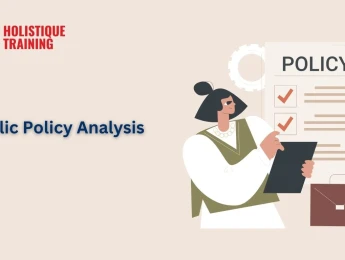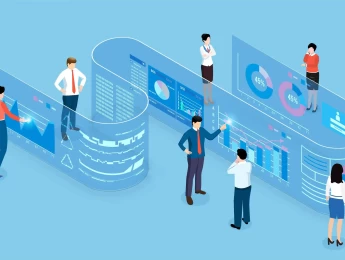To execute a powerful business strategy in the gas and oil industry, it’s important to assess the full picture and understand the environmental effects, competitor motivations, and economic risks.
Decision-making Support Systems (DMSS) are a collection of systems and techniques that help businesses in the energy sector make sensible and beneficial decisions about processes, sales, and developments.
These support systems will give you the tools to analyse trending data and risk areas and create an accurate cost-benefit analysis for future projects.
Your decision-making tools and systems can also help you back your changes with data and support your change processes to increase your chances of securing beneficial partnerships and future investors. Your energy business will massively benefit from structured decision-making processes which can develop a clear plan of action for your future.
Upon completion of this course, participants will be able to:
- Define your decision-making requirements.
- Integrate end-user requirements to support project design decisions.
- Identify sources of safety and financial risks.
- Assign project costs and develop effective cost-benefit analyses to aid decision-making.
- Understand how to deal with uncertainty.
- Utilise your decision-making skills to create a quality product and productive workforce.
- Estimate the project’s change costs and benefits to your supply chain.
- Understand how your decision can be affected by environmental change.
This course is designed for anyone responsible for designing projects and developing an accurate outcome analysis in the oil and gas industry. It would be most beneficial for:
- Business Owners
- Senior Partners
- Project Planners
- Finance Managers
- Supply Chain Managers
- Change & Control Managers
- Risk Assessors
- Commercial Managers
This course uses various adult learning techniques to aid full understanding and comprehension. Participants will review best practice examples of project management within the oil and gas industry and be presented with various tools, techniques, and technology to implement a project management and change structure.
They will hold group discussions to highlight the main risk areas and work together to understand the best mitigation techniques based on accurate data analysis. Together, they will work to create a project plan involving insightful changes that will improve the productivity or quality of their service and workplace, utilising their background knowledge. They will then present potential changes to the group and understand how their developments could appeal to future partners and investors based on the planned changes' clear benefits and solid framework.
Day 5 of each course is reserved for a Q&A session, which may occur off-site. For 10-day courses, this also applies to day 10
Section 1: Important Project Management Concepts
- Projects and programs that work.
- Reviewing your competitors.
- Your project lifecycle.
- Change management and team alignment.
- Gate changes and understanding the consequences of change.
- Your environmental responsibilities.
- Understanding safety procedures.
Section 2: Project Negotiation & Approval in the Oil & Gas Industry
- Sanctioning and approvals processes and what to look out for.
- Developing your base project framework.
- Identify the need for your project.
- Presenting a clear business case.
- Awareness and accountability.
- Assigning responsibilities.
- Surveys and exploration.
Section 3: Understanding the Context of Your Project in the Wider Industry
- The macro-environmental responsibilities and concerns.
- Understanding and dealing with stakeholders.
- Your impact on other organisations and the wider industry.
- Where you sit on the regulatory framework.
- Securing your infrastructure during change.
Section 4: Your Project Lifestyle
- Feasibility of your decisions.
- Developing a decision-making team.
- Assigning responsibilities based on the area of expertise.
- Testing and re-testing.
- Preparation and planning responsibilities.
- Record keeping.
Section 5: Utilising Effective Leadership Skills
- Effective communication with your team.
- Work together toward continuous improvement.
- The inner workings of a typical gas and oil project.
- Who needs to know what?
- The unique requirements of a good project manager.
- How to use communication to benefit you.
Section 6: Your Budget & Finance Plan
- Financing your project responsibly.
- Securing the best finance deals.
- Using data to obtain funding.
- Credit risk considerations.
Section 7: Cash Flow Evaluation Methods
- The time value of money.
- How the value of money applies to your project.
- Your yield and returns rates.
- Discounted cash-flow considerations.
- Analysis and data utilisation.
Section 8: Risk Areas & Project Failures
- Why do some projects fail?
- What makes a successful project?
- What can you learn from past projects?
- Analyse and gain feedback from previous experiences.
Section 9: Integration & Seeing the Bigger Picture
- KPIs and success criteria definitions.
- Capturing your requirements in data form.
- Your project charter.
- Developing and supporting a team approach.
- The importance of communication.
- Workforce management and contract awarding.
Section 10: Reporting, Preparation & Stakeholder Engagement
- Decommissioning and rehabilitation.
- Controlled decision-making.
- Types and intervals of change.
- Centralised vs. participatory monitoring methods.
- Speaking to your key stakeholders.
Upon successful completion of this training course, delegates will be awarded a Holistique Training Certificate of Completion. For those who attend and complete the online training course, a Holistique Training e-Certificate will be provided.
Holistique Training Certificates are accredited by the British Assessment Council (BAC) and The CPD Certification Service (CPD), and are certified under ISO 9001, ISO 21001, and ISO 29993 standards.
CPD credits for this course are granted by our Certificates and will be reflected on the Holistique Training Certificate of Completion. In accordance with the standards of The CPD Certification Service, one CPD credit is awarded per hour of course attendance. A maximum of 50 CPD credits can be claimed for any single course we currently offer.
Tags
Decision Making, petroleum, Cash Flow, finance, budget, Support, Systems, Gas & Oil, Management,- Course Code IND01-129
- Course Format Classroom, Online,
- Duration 5 days














